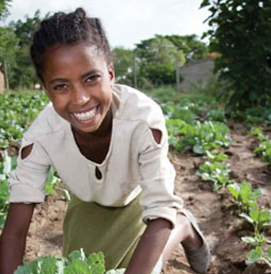Small scale, big impact: unlock the potential of smallholders and we can achieve Zero Hunger
The single most important thing governments can do to end global hunger is to support the millions of poor women farming tiny plots of land in developing countries, a new report by a group of international charities says today.
 As the UK prepares to host a high-level ‘Hunger Summit’ alongside the G8 summit, the report from the Hunger Alliance – of which World Vision is a member - says helping women grow more food in their back gardens could be a ‘game changer’, and also calls for greater support for all small farmers.
As the UK prepares to host a high-level ‘Hunger Summit’ alongside the G8 summit, the report from the Hunger Alliance – of which World Vision is a member - says helping women grow more food in their back gardens could be a ‘game changer’, and also calls for greater support for all small farmers.
There’s enough food in the world for everyone, but one person in eight still goes hungry every night, and 2.3 million children die needlessly each year from malnutrition.
If you’re the one in eight, there’s a good chance you’re a small-scale farmer living in a developing country, because these farmers make up three-quarters of the world’s hungry. They work hard to cultivate plots of land of just two hectares or less – equivalent to two or three football pitches – in an attempt to feed their families. Most can't manage to grow enough food to do so adequately.
With enough training and support, this wouldn’t be the case. These small farms are a vast, under-used resource, dominating the agricultural landscape in many developing countries and producing 80% of the food supply. In Bangladesh, 96% of farms are two hectares or less; in Ghana the figure is 85%; in India 82%. Unlocking their potential is an essential way to end hunger.
The single biggest ‘game changer’ in reaching this goal would be greater support for women farmers. Focusing on women is important because women account for some 60% to 80% of food production in developing countries, and yet only 5% of government agricultural services, such as training in agriculture techniques and livestock vaccination programmes, ever reach women farmers.
The report found that hunger and malnutrition could be substantially reduced if more women had the agricultural training and equipment they needed to successfully grow food on small plots in and around their homes and were offered complementary support in nutrition, sanitation and health. For example, a programme in Bangladesh that provided training in home gardens, maternal health, nutrition, immunisation and financial services to women resulted in a 16% decrease in child stunting over three years.
Geoffrey Dennis, Chief Executive of CARE International UK, who currently chairs the Hunger Alliance, said: “Women hold responsibility for both food production and childcare in developing countries, so focusing investment on the skills of women farmers is one of the most effective ways to tip the balance from malnutrition and poverty into good health and greater prosperity for them and their families.”
In line with the Enough Food For Everyone IF campaign – a coalition of development charities and faith groups lobbying for the UK to use its presidency of the G8 to help end global hunger – the report calls for the UK government to invest an additional £425 million per year in small-scale agriculture, representing the UK's share of what is needed to fill the gap in poor countries' agricultural funding.
Its core findings are:
• Invest in small-scale farmers, especially women.
• Promote home gardens, small-scale livestock and fish rearing.
• Complement agricultural programmes with education and nutrition communication, health services, clean water and sanitation.
Small-scale farming has environmental benefits too. Smallholder agriculture tends to include a mix of plants, trees and animals, which helps sustain local ecosystems, and appropriate small-scale farming practices can both protect and rejuvenate the environment. The more viable these farms are economically, the more incentive there is for farmers to preserve those ecosystems.
The report published today was commissioned by the Hunger Alliance from the Overseas Development Institute and analyses decades of findings from programmes designed to combat food and nutrition insecurity in Bangladesh, Ghana, Tanzania, Zambia and India.
It urges G8 leaders gathering at the ‘Hunger Summit’ to invest in the productivity of small-scale farmers as the only realistic way of meeting the UN Secretary General’s Zero Hunger Challenge of eradicating hunger by 2025.